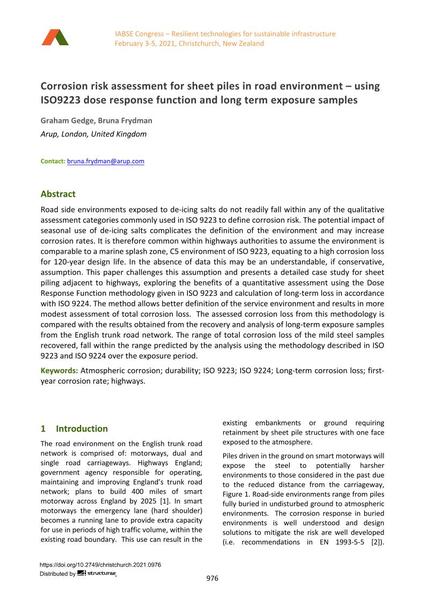Corrosion risk assessment for sheet piles in road environment – using ISO9223 dose response function and long term exposure samples

|
|
|||||||||||
Détails bibliographiques
| Auteur(s): |
Graham Gedge
(Arup, London, United Kingdom)
Bruna Frydman (Arup, London, United Kingdom) |
||||
|---|---|---|---|---|---|
| Médium: | papier de conférence | ||||
| Langue(s): | anglais | ||||
| Conférence: | IABSE Congress: Resilient technologies for sustainable infrastructure, Christchurch, New Zealand, 3-5 February 2021 | ||||
| Publié dans: | IABSE Congress Christchurch 2020 | ||||
|
|||||
| Page(s): | 976-983 | ||||
| Nombre total de pages (du PDF): | 8 | ||||
| DOI: | 10.2749/christchurch.2021.0976 | ||||
| Abstrait: |
Road side environments exposed to de-icing salts do not readily fall within any of the qualitative assessment categories commonly used in ISO 9223 to define corrosion risk. The potential impact of seasonal use of de-icing salts complicates the definition of the environment and may increase corrosion rates. It is therefore common within highways authorities to assume the environment is comparable to a marine splash zone, C5 environment of ISO 9223, equating to a high corrosion loss for 120-year design life. In the absence of data this may be an understandable, if conservative, assumption. This paper challenges this assumption and presents a detailed case study for sheet piling adjacent to highways, exploring the benefits of a quantitative assessment using the Dose Response Function methodology given in ISO 9223 and calculation of long-term loss in accordance with ISO 9224. The method allows better definition of the service environment and results in more modest assessment of total corrosion loss. The assessed corrosion loss from this methodology is compared with the results obtained from the recovery and analysis of long-term exposure samples from the English trunk road network. The range of total corrosion loss of the mild steel samples recovered, fall within the range predicted by the analysis using the methodology described in ISO 9223 and ISO 9224 over the exposure period. |
||||
| Mots-clé: |
ISO 9223 ISO 9224
|
||||
